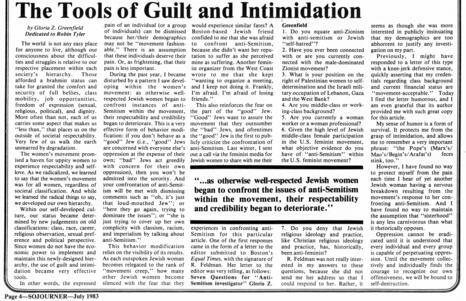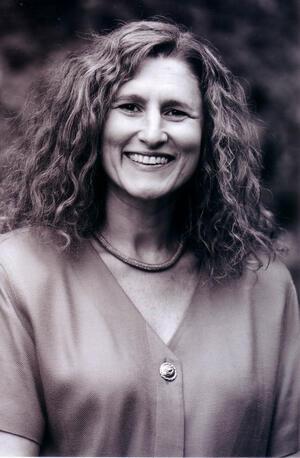Gloria Greenfield
My final speech as a radical feminist activist was delivered in June 1983, at the San Francisco Lesbian and Gay Rally, where I addressed anti-Semitism in the women’s movement. While I had been writing and speaking about anti-Semitism in the women’s movement for several years, this particular speech was intended to serve as my “goodbye to all of that.” I had decided that I needed to “go home”; I was making a conscious decision to change my primary identity from “Jewish radical feminist” to “feminist Jew.” I declared that for me, confronting sexism within the Jewish community would be more life-affirming and productive than continuing to fight anti-Semitism from inside of the women’s movement, which was supposed to be committed to the liberation and safeguarding of all women. It was clear to me that even though the radical feminist community claimed to have disengaged politically from the male Left, it did not purge itself of the Left’s virulent and historical anti-Semitism. Dr. Phyllis Chesler, another veteran of the radical feminist movement, addresses this phenomenon brilliantly in her latest work, The New Anti-Semitism.
The anti-Semitic instances I encountered within the feminist movement are too numerous to list, but I can share a few examples. In 1980, I was researching the escalation of anti-Semitism in Europe and its relationship to neo-Nazi printing presses in the U.S. Midwest. I was confronted by two leading lesbian-feminists who told me that they did not approve of my visiting concentration camps in Europe, since it would take my attention away from my anti-racist work. When I returned from a trip to Israel where I had been working with Israeli feminists, a well-known lesbian-feminist poet demanded a meeting with me, during which she told me that I had no right to visit or support Israel, which she considered a racist country.
The last straw occurred in 1983. Persephone Press, the feminist book publishing company I co-founded with Pat McGloin, signed a contract with Jan Clausen, a white lesbian-feminist author for a novel she was in the process of writing. The completed manuscript that we received months later turned out to be a novel about a stereotypical Jewish capitalist landlord who was destroying peoples’ lives by gentrifying Park Slope. Within an hour of reviewing the contract, we notified this white, gentile author that her book contract was cancelled on the grounds of its anti-Semitic stereotyping. The next day we were beckoned to a meeting in New York to meet with several of our prominent women-of-color authors to discuss the cancellation of Clausen’s contract. I began the conversation with the question, “Persephone Press cancelled the contract for an anti-Semitic novel written by a white Christian woman. Why are we here?” Their collective response was “She is a friend of women of color, so if you hurt her, you hurt us.” In this very brief dialogue between Persephone Press and the leading Hispanic and Black lesbian-feminist writers, poets, and theoreticians, it became very clear that at worst, anti-Semitism was considered acceptable, and at best anti-Semitism was considered insignificant. I had devoted many years of my life to the radical feminist movement, and at this moment I realized that I no longer wanted to contribute my life’s energy to it, nor did I want to remain a part of it.
While I have not diminished my feminist consciousness, I feel much more integrated with the prioritization of my Jewish identity; I am a Jewish woman – a Jewish woman who is both feminist and Zionist.
Gloria Z. Greenfield has served as director of the Adult Learning Collaborative: A Program of Combined Jewish Philanthropies and Hebrew College since 2001. One of the key programs in the Collaborative is the Jewish Women's Studies initiative, which brings the leading Jewish feminist scholars from North America, Europe, and Israel to Boston. Greenfield received her B.A. in Communications, with a minor in Women's Studies, from the State University of New York at Oswego in 1974. She also did graduate work in the History of Women in the U.S. at Goddard-Cambridge Graduate Program in Social Change, and in Jewish Studies at Hebrew College. During her undergraduate tenure, Gloria founded the Oswego Women's Center, Women for a New World, Alliance of Women Against Repressive Education at SUNY, We Are the Women Your Fathers Warned You Against, and the Red Rag Regime. In April 1976, she founded Persephone Press, a leading radical feminist book publishing company, which she ran until May 1983. In 1980, Greenfield was cited as a Ms. magazine “Woman to Watch” in the 80s. Other honors include the Keter Torah award of the Bureau of Jewish Education for her outstanding contribution to adult Jewish education (2005).




